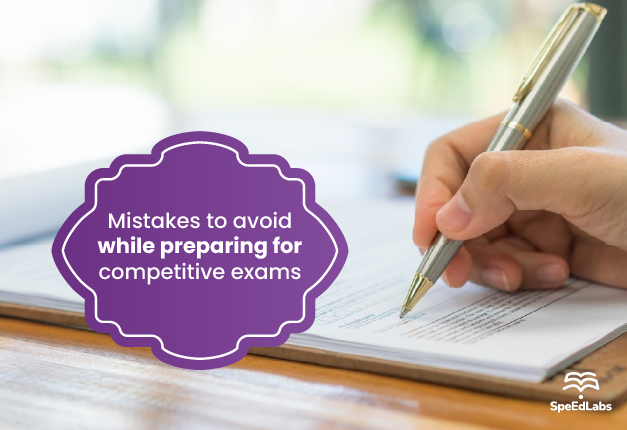Exams are important because they shape students’ futures and affect their daily lives. As they prepare for their exams, students are so anxious that they make many mistakes, which ultimately lowers their overall percentage. What are the common errors students make when studying for exams? Let us have a look at them.
-
CONTINUALLY SPENDING A LOT OF TIME STUDYING
Students start studying continuously for 5–6 hours per day as the board exams get closer. Contrary to popular belief, prolonged study sessions do not help students focus. The complete opposite of what happens occurs. Studying continuously causes your brain to eventually stop functioning, which makes it difficult for you to focus.
As a result, it is advised that you take a few breaks. Make sure to take breaks between studying for at least 8 to 12 hours per day.
-
DIRECTLY JUMPING TO EXTRA RESOURCES AND GUIDES
The ability to answer various types of questions and gain additional knowledge can both be increased by practising from study guides. However, students should not attempt this until they are an expert at solving the kinds of questions and issues that are presented in their textbooks and syllabus. Many students make the mistake of moving directly to professional guides and numerical questions in the mistaken belief that they will benefit from doing so, but because they are unfamiliar with the most fundamental ideas and issues, doing so will be extremely difficult for them and cause more harm than good. This advice demonstrates that you can err during exams.
-
EXCESSIVE RELIANCE ON EDUCATORS
Many students assume that as long as they attend the review sessions led by teachers and study the material from the study guides teachers give them, they will perform well on the exam. The teacher’s guide is a fantastic resource for getting an idea of the information needed to pass the exam. It can be extremely helpful during the preparation process, but simply reading the study guide and attending the review sessions is not enough to ensure success. You must accept responsibility for making sure you fully comprehend the material if you hope to perform well on the exam.
-
NOT STARTING PREPARATION ON TIME
Many students wait until there are just a few weeks until the exams to begin studying. Absolutely forbidden. It is better to get started early because board exam preparation frequently takes longer than you anticipate. The fact that you will have enough time for revision is one of the main benefits of starting early. If you start preparing early, you will not have to worry about how well you will do or whether you’ll have time to finish the paper in time when the test is almost over.
-
MUGGING UP AT THE LAST MINUTE
Students frequently tend to leave a few details until the very last minute. Just before they enter the examination room, students believe they will review a few notes. They think doing this will help them remember things. This mindset, though, is incorrect. There is a lot of confusion while writing the exam when mucking up at the last minute. You can avoid that confusion by not leaving anything until the last minute.
-
STUDYING WITHOUT A PROPER PLAN AND STRATEGY
One of the common mistakes students make is beginning their studies without having a clear idea of their priorities, the field they want to pursue after class X or the subjects they should concentrate on in that session. If a student does not know the grades required for a successful career, the study materials that should be used, or how to study effectively, there is a good chance that he or she will be unprepared for the exam.
-
AVOIDING MOCK TESTS AND PRACTICE PAPERS
Numerous applicants continue to study. Thus far, so good. However, taking practice tests before competitive exams is crucial. Only this will enable them to identify their strong points and areas for improvement, as well as prepare them for the exam.
There are many things at play here like negative marking, time constraints, etc. that decide the outcome.
-
ONLY STUDYING HARD AND NOT SMART
Even though they appear to have done everything right, many applicants are rejected. They would have worked arduously to prepare, spending a lot of time going over practice exams and question papers. Why did they fail the exam, then? The ‘correct approach’ is the cause. To prepare effectively, it is critical to understand how to study, what to study, and what not to do. Knowing which mock tests are the best is necessary; solving papers is not enough. Furthermore, one needs to be aware of the exam’s most important subject matters.
You can have a lot of time on your hands and use it in various ways if you refrain from making these mistakes.
Also published on Medium.
